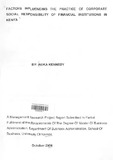| dc.description.abstract | The Banking industry in Kenya is governed by the Companies Act, the Banking Act, the Central Bank of Kenya Act and the various prudential guidelines issued by the Central Bank of Kenya (CBK). The banking sector was liberalized in 1995 and exchange controls lifted.
The commercial banks and non-banking financial institutions offer corporate and retail banking services but a small number, mainly comprising the larger banks, offer other services including investment banking. According to the Financial Institution Inspection Department report of the Central Bank of Kenya (FISD Annual Report, 2004) the structure of the banking sector is comprised of 51 financial institutions with 44 commercial banks 2 non-bank financial institutions, 2 mortgage finance companies and 3 building societies with a total of 532 branches across the country.
It is generally observed that many banks are getting involved in the practice of Corporate Social Responsibility (CSR).
The research objective of this study is to determine the factors that influence the financial institutions in Kenya to practice corporate social responsibility.
The design that was used in this research was a descriptive survey design. The population consisted of 48 financial institutions in Kenya as per the Central Bank of Kenya report (December 2005). The study was a census survey of all the 48 financial institutions in Kenya since the population of all the financial institutions was small and the institutions are quite different from each other in terms of ownership, size, period they have been in existence, management setups and geographical areas of operations.
The study was conducted by administering questionnaires to bank managers in charge of corporate affairs. These questionnaires sought to find out general
vii
information of each banks, how they rated the various factors that influence the practice of corporate social responsibility and the perceived benefits to banks that come as a result of them engaging in social activities.
The data was analysed using descriptive statistics and these were the mean scores, percentages, frequencies and standard deviations. The findings were presented using tables, graphs and pie charts.
From the findings, it was evident that all the banks that responded to the questionnaire practised corporate social responsibility through engaging in social activities which varied from bank to bank. Some of the social activities include the provision of HIV/AIDS support, Pre-university educational scholarships, security, poverty eradication, sports, street children rehabilitation, supporting the physically disabled and cooperative movement. Others supported children’s homes, contributing to the famine relief fund, health support through medical camps, provision of clean water and sanitation through construction of safe and sustainable water management resources, reforestation of depleted government forests and promotion of entrepreneurship and business ethics among university students.
Further the study shows that the factors that have great influence on the extent of the practice of Corporate Social Responsibility (CSR) in the financial institutions is corporate image, moral obligations and solving societal problems. Other factors that moderately influenced the practice of CSR are company policies, publicity and long term profitability. Pressure from society and regulation compliance factors were found to have little extent in influencing the practice of CSR.
The study also found out that the important benefits of CSR to financial institutions is improved corporate image. Other benefits that were of moderate importance included increased sales and customer loyalty, keeping up with
viii
competition and increased productivity and quality. Benefits like Increased ability to attract and retain employees, access to capital, reduced risk and minimizing unnecessary regulations were found to be of little importance. The research concludes that corporate image, moral obligations and solving society problems have great influence on the extent of the practice of CSR in the financial sector. | en_US |



